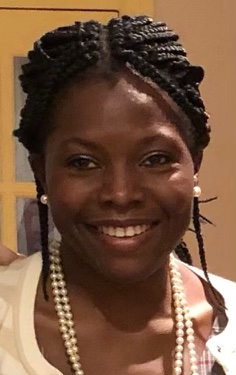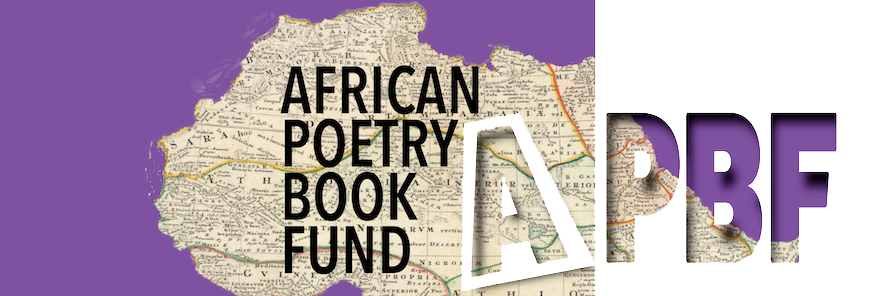On Writing Poems of Migration & Identity: A Conversation with Nneoma Nwogu
To celebrate the launch of the latest in the New-Generation African Poets Chapbook Box Set series, Tisa, Tryphena Yeboah, is talking to poets whose chapbooks are included in New-Generation African Poets: A Chapbook Box Set (Tisa). This series continues with a conversation between Tryphena and lawyer and poet Nneoma Veronica Nwogu. The interview was conducted via email and has been lightly edited for publication.
Tryphena Yeboah: Congratulations on being selected as part of the 2023 New-Generation African Poets series! What a wonderful time for you, and a tremendous contribution to the growing body of African poetry in the world. What are your thoughts and feelings about this news?

Nneoma V. Nwogu: I am in joy. I am inspired. I am excited. I am moved. In some moments, I am frankly amazed. It has been a long journey towards getting this kind of recognition. A journey of fits and starts, self-doubt and self-belief. To have my poetry edited by Kwame Dawes and Chris Abani. To have a preface by the brilliant Saddiq Dzukogi. To find myself among soul kin in the world of African literary writing renders me speechless with gratitude. So, all in all, I am thankful.
TY: In Here, There, And What is Broken in Between, you engage with themes of African ancestry, spirituality, warrior songs, and Igbo burial dance. I’m curious to hear about your experience in researching and writing on these subjects.
NN: My poems often come from my lived experience. It has often been said that poetry is the art of noticing and that we can only really write well about what we know and the spaces we inhabit. I am artistically, emotionally, and spiritually curious about the world around me and many times through the filters of my own imagination. I partly grew up in Mbaise, my ancestral home in Nigeria. It is a place that holds very tender memories of love, family and community for me. It was a place where as a child, I found myself on the frontlines of life. My father was a doctor in the village so I saw the myriad ways in which our bodies can be warped by accident, nature (and in some cases, what people saw as a supernatural intervention).
The community also fervently believed in reincarnation and I along with many people I knew saw ourselves as dual persons and related to each other as such. There was also laughter and merriment when a child is born, someone gets married, or parents are celebrated in an Onyima ceremony; during Christmas, Easter or the new yam festival. Ceremonies were sacred and vibrant and it seemed like everything meant something. A tree that falls across a road overnight, a particular birdsong at a specific time of the day, the sighting of a rare animal or even the unusual location of a house animal; all was rife with meaning and frankly often danger. In some cases, it was comical and in others, frightening at the accuracy of interpretations that were given to events. All of this pulled me into the potent mix of what it meant to be of a line, of a people and a place in a time continuum unbroken by the rupturing experience of death or disaster.
I am artistically, emotionally, and spiritually curious about the world around me and many times through the filters of my own imagination.
Nneoma Nwogu
TY: In the poem “At the Warden’s Drinks,” you write in response to the question of identity: “Nigerian by colonization/ but Igbo by extraction/ made American by citizenship…” In exploring themes of migration, colonization, and identity, what has been key guiding questions and experiences that have shaped your engagement?
NN: I am very much at home with the notion that, in Walt Whitman’s words, “I contain multitudes.” “At the Warden’s Drink” is a poem that captures a moment of self-profession in response to that familiar destabilizing moment of questioning for those of us who are seen in some spaces as the “other.” In the poems where I explore the combined themes of migration, colonization and identity, I often find myself questioning whether the question “Who are you?” or “Why are you here” is an affirmation of a pre-existing self-interrogation: “Who am I in this space?” perhaps because I do not feel entirely myself or “Why am I here?” because the space itself does not entirely resonate as safe or frankly natural. Is the world affirming the alienation we already feel within or are we echoing within us a reality that is outside of us? I abhor the hubris that underpinned colonialism and feel saddened at never knowing what routes the cultural evolution of the Igbo people and the overall course of human history might have taken had human curiosity not yielded to unbridled greed. Yet, I accept the parts of me that are a product of colonialization.
I love tea and toast with margarine and marmalade. Sitting at the dining table with my father, this was a key part of my breakfast. After I lost my father at the age of 7, I still find cellular joy nearly 40 years later, whenever my breakfast includes tea and toast with margarine and marmalade. This is the same with migration. My American journey has been one that also has its contradictions. To live in a country built on an aspirational idea which allows for movement towards a north star resonates very much with me. The incredible opportunities I have been given as a life learner is something I believe to be unique to America. Yet, with the killing of Amadiou Diallo soon after my arrival to America to Sandra Bland, to George Floyd, the question never ceases: “Who am I in this space?”
I abhor the hubris that underpinned colonialism and feel saddened at never knowing what routes the cultural evolution of the Igbo people and the overall course of human history might have taken had human curiosity not yielded to unbridled greed. Yet, I accept the parts of me that are a product of colonialization.
Nneoma Nwogu
TY: As a selectee for this year’s new generation series, you have become part of the APBF African poets “family”. What does it mean to be part of a growing body of contemporary poets emerging from the continent?
NN: It is indeed daunting but also gives me a profound sense of belonging to think of myself as part of the body of contemporary poets emerging from the continent. It feels like in the words of Mary Oliver that “the world has called to me, announcing [my] place in the family of things.” This moment feels wonderful even as I know that the journey of writing can be undulating with its highs and lows. A friend once told me that when you have wrestled with the angel in the night, be sure to build an altar there. The process of arriving to the publication of my first chapbook and no less with APBF has been a long night of wrestling with an angel whom I could not release until I was blessed. By this I mean the angel of my own inner doubts, about my space in the world of literary writing. So, to be part of this body of contemporary poets is act of affirmation that tells me to keep writing, because it is on us to protect and carry forward our literary traditions; because in the end it is clear that, as Chinua Achebe writes in Beware Soul Brother, there is such a place where our “foot must return whatever beauties it may weave in the air, where it must return for safety and renewal of strength.”
TY: What does being an African poet mean to you?
NN: First, I’d say that I am poet who is African among the other ways in which I exist and move in the world. I am also a woman, an immigrant, an American, an Igbo, a lawyer, a Catholic. All these aspects are somewhat different but coherent to who I am and also inform my writing. But this aspect of being a poet who is African is to enter or perhaps to unveil a part of me that is sound, sweet and settled. It feels a little like what recognition is, to re-know. It is for me a journey in which I am re-knowing myself and reveling in that re-cognition. In school, I learned and loved the poetry of Africans, from David Diop’s “Africa my Africa” to Richard Ntiru’s “Pauper Pauper” to Kofi Awoonor’s “Songs of Sorrow,” and Wole Soyinka’s “Telephone Conversation”(It is sad to me that I cannot recall any women poets being taught to me from those days). To someday write something that would summon emotion in an African child or unleash inspiration in the ways that I experienced when reading these poets would be for me… (Can I just render silence in place of a word because there are no words to capture what it means or how it would feel for me?)
TY: Your first chapbook is out in the world and I hope this is not too daunting of a question to ask, but I’m eager to hear what projects you’re currently working on and if you have any exciting works in the pipeline?
NN: I have multiple projects in the works. One is a memoir that ties together themes of childhood loss of a parent, poetry, ancestry and spirituality which came out of a letter I had written my father in the preparation of a memorial for him in 2016 to make sense of my loss of him. In 2020, as I was watching human losses by the droves and the murder of George Floyd, I saw myself brushing against the edges of my own resilience and I found my anchor in the writing of this memoir. I am hoping for an agent and/or editor and I have faith that the spirit of those of whom I am writing about will propel a movement for this memoir to find the light of day. I am also working on a collection of short stories and pushing myself towards an exercise of writing a chapbook of poetry in Igbo. I do not know which of these will find its existence beyond the pages of my own notes and files. So, outside of those, in general, I keep reading and writing always. Like breathing air.
Nneoma Veronica Nwogu is an Igbo-American writer, lawyer and professor. She holds a BA from Wellesley College, an MPhil from Oxford University and a JD from the University of Michigan. Her academic publications focus on law, justice and development, natural resource governance, and the role of technology in development. Her literary works have appeared in the Poetry Guild, Farafina, Leverage, and the Oxonian Review of Books. With her ancestral home in Mbaise, Nigeria, she now lives in Washington DC.
Tryphena Yeboah is a Ghanaian writer and the author of the poetry chapbook, A Mouthful of Home, selected by the New Generation African Poets Series. Her fiction and essays have appeared in Narrative Magazine, Commonwealth Writers, and Lit Hub, among others. She is currently a Ph.D. student at the University of Nebraska-Lincoln, studying English with an emphasis in Creative Writing.
